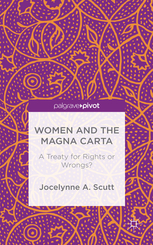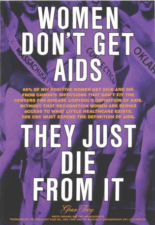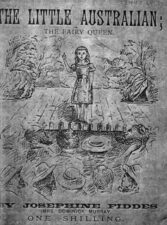 Jocelynne Scutt
Jocelynne Scutt
Part 2
Chapter 1 … Are Women Persons?
… We have … granted to all freemen of our kingdom, for us and our heirs forever, all the underwritten liberties, to be had and held by them and their heirs, of us and our heirs forever.
Magna Carta, Art. 1
Does ‘Man’ Embrace ‘Woman’?
In 1850 the United Kingdom Parliament passed ‘An Act for shortening the Language used in Acts of Parliament’. Under Lord Brougham’s Act, ‘unless expressly provided to the contrary’, words importing the masculine gender would be ‘deemed and taken to include female’. Today, some Interpretation Acts endorse gender neutral language in statutes, yet some continue the legislative fiction ‘man embraces woman’.
Magna Carta incorporates no such fiction. ‘Freeman’ did not mean ‘freewoman’. Black’s Law Dictionary defines ‘freeman’ as men possessing and enjoying all civil and political rights under a free government. Some men were excluded from the King’s grant under Magna Carta. Slaves, vassals, or villeins did not count. What of women?
As Magna Carta attests, in 1215 the Church was central to social and cultural life. Common law and ecclesiastical law existed together. Ecclesiastical law impacted on women’s religious and secular lives. Religious precepts elevating men as head of household and family did not end on the church stoop, prevailing inside and outside the home. Meanwhile, ‘benefit of clergy’, the common law escape from the death penalty for felonies, benefitted men alone. A man who could read a nominated scripture (possibly learned by heart) dodged the gallows. Because the Church rejected women as clerics, literate women, or women capable of memorising text, lost protection of pretence or fiction of being clergy: they could not escape hanging.
Through the medieval period, some women exercised some civil and political rights. On occasion a woman, particularly a widow whose husband had been an important land holder, voted in Parliamentary elections. Sometimes widows entered trades by taking over a husband’s bakery, foundry or blacksmithy. Some widows appeared as courtroom litigants where their livelihood or lands were threatened.
Personhood is seen as a field of rationality to which only men belong: women are distanced by their biological capacities. Abortion and surrogacy highlight the issue. Women’s lack of personhood is at the core of arguments oppositional to abortion and supportive of surrogacy. The Baby ‘M’ case, the first where a court grappled with surrogacy, provides a graphic illustration. There, Mary Beth Whitehead gave birth to Sara (Baby ‘M’) under a contract initially held valid, then struck down, whereby the child (using Bill Stern’s semen, Whitehead’s ovum) went to Stern and his wife. In the first instance, contradictorily the court said the best interests of the child was determinative, despite the contract’s terms categorically stating the child was to go to Stern. The appellate court pinpointed this contradiction, nevertheless holding that the child must go to Stern ‘in Baby “M”’s best interests’. That Whitehead had borne the child was irrelevant.[i]
Assertions that in the circumstances Whitehead exercised agency are surely misguided. Besides, courts consider ‘best interests’ in favour of the child, not the woman giving birth. She is not a person, but a receptacle whose interests as a human being are ignored. Notions of ‘agency’ fall away when participants in such ‘agreements’ are revealed. US surrogacy organisations locate near army bases, a market providing women who for financial reasons are targets.[ii] Tertiary students needing financial assistance are also targeted – hardly indicative of agency. This choice of biological mother is based on wanting babies from women classed intelligent. Also targeted are women with few financial opportunities – from India and Thailand.[iii] They, too, are receptacles, not persons, their capacity for nurturing a foetus and giving birth the criteria upon which they are chosen.
With abortion, the Abortion Act 1967 (UK)[iv] says a pregnancy termination will not be illegal if conducted by a registered medical practitioner, where two are of the opinion, ‘formed in good faith’ that the pregnancy is 24 weeks or less, and:
- its continuation would ‘involve risk, greater than if the pregnancy were terminated’, of physical or mental health risk to the woman or her children; or
- it is necessary to prevent ‘grave permanent injury’ to the woman’s physical or mental health; or
- its continuance ‘would involve risk to [her] life greater than if the pregnancy were not terminated’; or
- there is a substantial risk to the putative child of physical or mental abnormalities so as to be seriously handicapped on birth.
Albeit welcomed as a huge step forward for women, the law treats women as lesser persons. No other medical operation requires legal authorisation by two doctors or special dispensation from this requirement. Still, at least women have an acknowledged right, however circumscribed.
*****************************************************
[I] In re baby M, 537 A2d 1227, 109 N.J. 396 (N.J. 02/03/1988).
[ii] Kathryn Jean Lopez and Kathleen Sloan, ‘A War on Women that Left and Right can End Together’, NR Interview, National Review, 28 June 2013, http://www.nationalreview.com/article/352254/wombs-rent-interview (accessed 23 June 2015).
[iii] news.com.au, ‘Babies – Thousands of Infertile Australians paying for surrogacy in India and Thailand, Latest in Lifestyle – Parenting, 3 April 2014, http://www.news.com.au/lifestyle/parenting/thousands-of-infertile-australians-paying-for-surrogacy-in-india-and-thailand/story-fnet08xa-1226872653386 (accessed 23 June 2015); Jennifer Kirby, ‘These Two Americans Want Babies Through Indian Surrogates: It Hasn’t Been Easy’, New Republic, 10 December 2013, http://www.newrepublic.com/article/115873/fertility-tourism-seeking-surrogacy-india-thailand-mexico (accessed 23 June 2015).
[iv] Not proclaimed in Northern Ireland.
Jocelynne A. Scutt is a Barrister, Human Rights Lawyer, Commentator and Writer.
Woman and the Magna Carta Treaty for control or Freedom is published by Palgrave Pivot and available on Amazon, eBook and bookshops.


